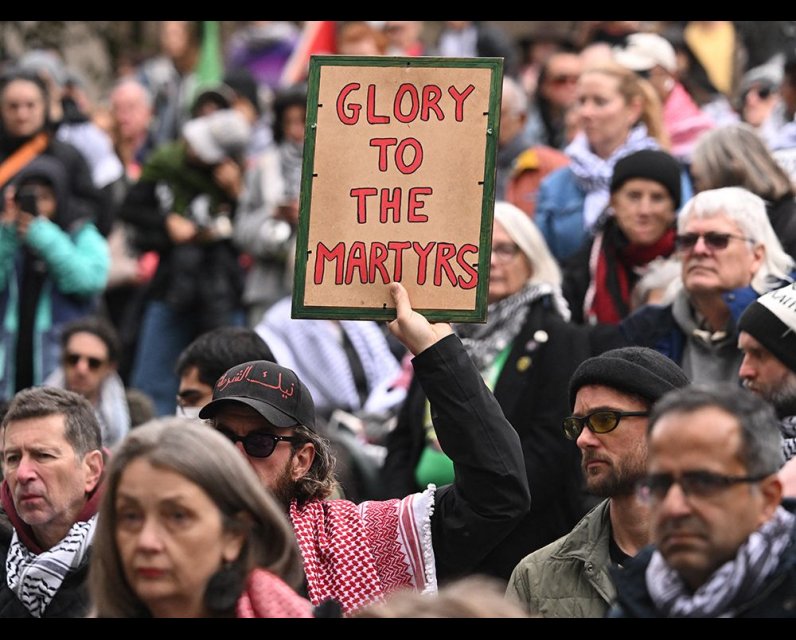John Ivison: Carney's Canada advances terrorists, not Mideast peace

When Mark Carney was asked whether Canada will follow France (and now Britain) in unilaterally recognizing Palestinian statehood, his reply was ominous.
Canada will work with the international community — “with others” — to move towards a ceasefire and a two-state solution, he said.
In an interview on CNN last month, Carney talked about working “on a path to a Palestinian state … a Zionist Palestinian state that would recognize the right of Israel to exist and prosper.”
Since Canada has signed a strategic partnership with the European Union to pursue common interests, it is a reasonable assumption that at Wednesday’s virtual cabinet meeting, Carney will advocate that Canada follows France and Britain’s lead.
To do so would be a mistake. It might be a case of stating the blindingly obvious, but such a move would vindicate Hamas’s strategy that jihad, violence and blood sacrifice are the only ways to get what you want – and that the chain of events that led to statehood started on October 7th.
Rather than drawing Hamas towards a ceasefire, this initiative is having precisely the opposite effect.
Predictably, with the tide of global public opinion, if not the war, turning in its favour, Hamas is no longer interested in a ceasefire. The U.S. recalled its negotiating team from Doha last week, as special envoy Steve Witkoff said there was a “lack of desire” on the part of Hamas.
As British-Israeli former hostage Emily Damari posted on social media in response to U.K. Prime Minister Keir Starmer’s statement, recognition does not promote a solution, it prolongs the conflict. “The move does not advance peace, it risks rewarding terror,” she said.
Israel has been its own worst enemy in creating the conditions that has allowed Hamas to stand on the cusp of a symbolic victory.
Carney’s criticism last week that the Israeli government has failed to prevent the rapidly deteriorating humanitarian crisis in Gaza is legitimate.
Even Israel’s supporters concede that Benjamin Netanyahu erred when he stopped all aid to Gaza in March, at the behest of his far-right coalition members.
He compounded the mistake by assuming responsibility for all aid and food distribution to civilians under the Gaza Humanitarian Foundation initiative, that created aid hubs outside population centres and resulted in the deaths of hundreds of Gazans.
These policy errors have created the very real prospect of mass starvation. Research from Hebrew University indicates that flour prices have increased 80-fold. Even Donald Trump has said that there is “real starvation” in Gaza.
Israel has responded by announcing changes to aid operations: more air-drops of pallets of food; “pauses” in combat operations for 10 hours a day in populated areas; and the opening of humanitarian corridors to provide secure routes for United Nations agencies.
But it is all too late.
Three-quarters of Israelis want an end to the war (if Hamas releases all 50 remaining hostages — of whom only 20 are thought to be still alive).
They are increasingly aware Israel is becoming a pariah to many.
Public opinion across the West is largely united in opposition to Israel. A new Gallup poll this week suggests only one-third of Americans support the Jewish state, down 10 points from last September, while six in 10 disapprove. Earlier polls indicate similar levels of support in Canada.
Hamas, which has called on all nations to follow France’s lead, must be delighted.
As veteran Israeli journalist Nadav Eyal told the Call Me Back podcast, Hamas has always tried to convince the world that Gaza is the victim of its own genocide, in pursuit of the legitimacy it needs for nationhood. Those efforts have proven to be in vain until now, when the facts on the ground have lent credence to such claims.
“This was always the project of Yahya Sinwar (the late former Hamas leader) — that only through violence would the state be born, through sacrifice and jihad,” he said.
There is a very good reason why for 75 years, Canada has insisted on the establishment of a Palestinian state as part of, but not before, a negotiated two-state solution: it is intended to be an incentive to bring the Palestinians to the table.
Former Israeli prime minister Ariel Sharon raised the possibility of Palestinian statehood two decades ago, on condition that the Palestinians demilitarize and give up on claims of “the right of return” to Israel.
While it is true that the two-state solution is dead for now, and that no talks between the two sides have been held since 2014, in time the prospects for a lasting peace may improve.
It makes no sense to have pre-emptively handed over a bargaining chip that could increase the chances of a lasting resolution.
Canada’s backing for Palestinian statehood would not make it a reality. The U.S. remains firmly opposed and will wield its veto on the Security Council at the United Nations.
But momentum is growing. In the last UN vote in May 2024, 143 countries voted to recognize an independent Palestine (Canada abstained).
It was not clear what anyone was recognizing. Did it include East Jerusalem as capital of the new country? Did it grant legitimacy to the Fatah government in the West Bank or Hamas in Gaza?
The only certainty is that Hamas wants a one-state solution from “the river to the sea.”
It is time for Israel to end a war that is not going its way. All of Canada’s energies should be directed towards that goal, rather than giving succour to its enemies.
National Post
jivison@criffel.ca
Twitter.com/ivisonJ

Comments
Be the first to comment